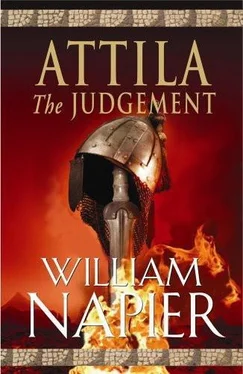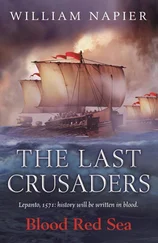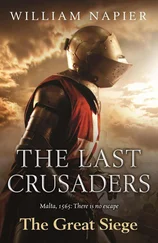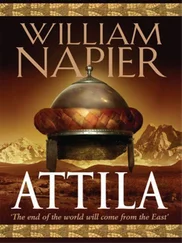William Napier - The Judgement
Здесь есть возможность читать онлайн «William Napier - The Judgement» весь текст электронной книги совершенно бесплатно (целиком полную версию без сокращений). В некоторых случаях можно слушать аудио, скачать через торрент в формате fb2 и присутствует краткое содержание. Жанр: Исторические приключения, на английском языке. Описание произведения, (предисловие) а так же отзывы посетителей доступны на портале библиотеки ЛибКат.
- Название:The Judgement
- Автор:
- Жанр:
- Год:неизвестен
- ISBN:нет данных
- Рейтинг книги:5 / 5. Голосов: 1
-
Избранное:Добавить в избранное
- Отзывы:
-
Ваша оценка:
- 100
- 1
- 2
- 3
- 4
- 5
The Judgement: краткое содержание, описание и аннотация
Предлагаем к чтению аннотацию, описание, краткое содержание или предисловие (зависит от того, что написал сам автор книги «The Judgement»). Если вы не нашли необходимую информацию о книге — напишите в комментариях, мы постараемся отыскать её.
The Judgement — читать онлайн бесплатно полную книгу (весь текст) целиком
Ниже представлен текст книги, разбитый по страницам. Система сохранения места последней прочитанной страницы, позволяет с удобством читать онлайн бесплатно книгу «The Judgement», без необходимости каждый раз заново искать на чём Вы остановились. Поставьте закладку, и сможете в любой момент перейти на страницу, на которой закончили чтение.
Интервал:
Закладка:
Bowed under woe, high spirits quenched,
Many a spear, dawn-cold to the touch,
Laid down at morning, harp swept in mourning,
Warriors shall not wake to that sorrowful dawning,
The raven wings dark over doomed hills,
Tidings of the eagle, how he rode and made war,
Numberless his enemies, countless the slain,
Lord of the wolf-lords, he harrowed the dead!’
‘A great pyre is burning,’ said Orestes.
Attila turned away from the distant orange glow, not wanting to see. ‘It is as the sorceries said. The enemy’s commander is slain. Aetius is dead.’
But word soon came that it was Theodoric. Aetius still lived.
Attila gripped the messenger’s arm fit to break it. ‘You are sure of this?’
‘He was seen at Theodoric’s pyre.’
Attila’s expression was fathomless. Thus were sorcerers’ prophecies fulfilled.
Nearby, a little-regarded person sat cross-legged in the corral as if at a Hun feast, rather than the worst killing-field in his people’s history.
‘Here is another prophecy for you, my master,’ he said. ‘No man will ever understand a prophecy aright, until it comes to pass. You understand a prophecy only as you understand your own life: looking backwards.’
Attila said not a word, but walked away from that sing-song, tormenting voice. He climbed up on a wagon, drew his bare sword, and stood for a long time staring south through the night: towards the burning pyre of that much-loved, noble-hearted king, laid out on his hide shield amid the prayers of his Christian priests, surrounded by a forest of lances.
It was like the pyre of an ancient hero of legend. Flames wrought havoc in the hot bonehouse, the bone-lappings burst, ribs fell like timbers into the fire. The sons watched their father’s body consumed without flinching. Their sister and father were together again.
As the pyre cracked and fell in a huge blaze of sparks, Torismond looked around for Aetius. Now that his father was gone, he wanted to be near the master-general. But Aetius had slipped away.
He had walked out alone onto the darkened battlefield, nothing but a knife in his hand. Everywhere there came to his ears the groans of the dying. Small groups of surviving Romans soldiers worked tirelessly among them, trying to stretcher them in. But there were many, many more wounded than unscathed. They would be working all night. He would come back soon and work with them. In final exhaustion he might find solace. For the groans burned into him like hot daggers, each one an accusation. Some of the dying called for God, some for their mothers, some for death. Of the three, only death the ever-faithful came to them.
And for what? It had taken the united forces of all of Rome and the Visigothic nation to stop him, the Scourge of God. And that is all they had done. They had not defeated him. They would never defeat him. You might as well try and defeat the wind. As for what men remained to Rome, Aetius had silenced an optio who tried to give him the numbers. He knew them already. Half the Gothic wolf-lords lay dead upon the field. Seven or eight thousand had laid down their lives for Rome. Of the twenty-five thousand in his own army, who had borne the brunt of the Huns’ attack, he doubted if five thousand were left standing. The Herculian and Batavian legions were effectively no more. The Palatine Guard had indeed fought to the last man, guarding the army’s left flank on that hill, the Huns pulling back only when all the Guard were dead and they saw their own horde in full retreat. The superventores were wiped out. The Augustan Horse, barely eighty left… Was it any consolation to know that, however many they had lost, the Huns had lost three times, four times as many?
He stopped beside one of his dead. No, it was no consolation. Captain Malchus had one arm completely severed; his face was a staring mask of blood. Aetius covered that face with a corner of his cloak. The Visigothic wolf-lord Jormunreik lay prone, his right hand still gripping his axe. Aetius reached out and touched his head, just once, wordlessly. He had seen cows touch a dead calf thus, just a gentle nuzzle, and he understood why. And here lay that great hulking brute of a Rhinelander, Knuckles. Aetius remembered the first time they had met, on the road to Azimuntium. Knuckles, son of the Rhenish whore Volumella. Aetius knelt by him and ran his hand down over his face, closing his eyes. ‘No son of a whore,’ he murmured. ‘Bravest of the brave.’
11
Another man moved across the battlefield, too, carrying a bare sword. He cared not. He muttered to himself, of Rome, and of China, moving among the dead. They were all gone into a world of light. Was it not so? Angelic work, then. He did not smile. Eternity’s work.
The moon was reflected in pools of horse-blood. As if it had fallen to earth.
There was a looter rifling through the wallets of the dead, stealing enamelled brooches, fibulae, rings from broken fingers. Maybe a villager or even one of his own, but he killed him anyway. Stepped up silently behind him and drove his sword down into the back of his neck. But immediately in the darkness, there was another. He felt weary. You cannot kill them all.
There was a warrior dying one-legged. There was a still-kicking horse. He was tired of killing. Tired among the heaps of the dead and dying, among the pools of blood and the broken weapons of war, among the dead rainbows and the fallen moon lying reflected in the pools of blood. He knelt abruptly and planted his sword in the earth. Let it remain there among the cold and dead.
At dawn, Attila realised that the Romans could attack him no more. They, too, were exhausted, what remained of them. He gave the order to break camp and the bedraggled remnant of his horde rode away east.
Once they were gone, the Romans and the Visigoths did likewise. Two-thirds of the men were wounded and dying, and the column moved very slowly. A vast silence settled over the Catalaunian Fields, and over the heaps of the innumerable dead.
That winter, there were many wolfpacks in that country.
Broken in spirit, the rag-tag army of Attila and his embittered mercenaries wreaked horrible, fitful revenge on the native populations through which they passed on their sullen retreat to their homelands. Some Burgundian captives were roped and dangled from trees and and used for target practice. They made the Burgundian children watch, thinking it amusing they should see their fathers stuck to death with arrows.
Their amusements left splayed bodies by the roadside, women with child torn open, the unborn whelps harrowed from their wombs and set on pikes. Molten gold was poured into the mouths of captured Jews, whom the mercenaries derided as Christless unbelievers. The last encampments and cave-dwellings of the quiet forest people of the Bohemian Forest, who hunted dormice and foraged for roots and berries, brown-eyed and dreamy and silent, a tribe of children, who even in that age lived on as they had lived in Europe for centuries, perhaps for millennia, speaking a language that no one else understood, as if from Eden before the Fall: they, too, were extinguished by the Harrowing of Attila, a nameless, unknown, preterite people, innocent as air. They were rounded up and put to the sword, going to their deaths mildly as they had lived, their small villages of straw huts left smoking in their sunlit glades. All suffered from the hordes of Attila.
Europe groaned and bled, and the King himself rode on in silence at the head of his defeated murderous horde, eyes fixed ahead, indifferent to the devastation left in his black and smoking wake. All the world burning and nothing left to save. If he could not be the Master of the World, he would be its Destroyer.
Читать дальшеИнтервал:
Закладка:
Похожие книги на «The Judgement»
Представляем Вашему вниманию похожие книги на «The Judgement» списком для выбора. Мы отобрали схожую по названию и смыслу литературу в надежде предоставить читателям больше вариантов отыскать новые, интересные, ещё непрочитанные произведения.
Обсуждение, отзывы о книге «The Judgement» и просто собственные мнения читателей. Оставьте ваши комментарии, напишите, что Вы думаете о произведении, его смысле или главных героях. Укажите что конкретно понравилось, а что нет, и почему Вы так считаете.












